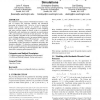281 search results - page 41 / 57 » A revealed preference approach to computational complexity i... |
TNN
2010
13 years 3 months ago
2010
Abstract--Recently, sparse approximation has become a preferred method for learning large scale kernel machines. This technique attempts to represent the solution with only a subse...
SIGECOM
2010
ACM
13 years 9 months ago
2010
ACM
Cut games and party affiliation games are well-known classes of potential games. Schaffer and Yannakakis showed that computing pure Nash equilibrium in these games is PLScomplete....
CHI
2005
ACM
14 years 9 months ago
2005
ACM
We study a collaborative location-based game in which groups of `lions' hunt together on a virtual savannah that is overlaid on an open playing field. The game implements a s...
CSB
2005
IEEE
14 years 2 months ago
2005
IEEE
Cutting-edge biological and bioinformatics research seeks a systems perspective through the analysis of multiple types of high-throughput and other experimental data for the same ...
FPGA
2004
ACM
14 years 2 months ago
2004
ACM
The simulation of large systems of biochemical reactions is a key part of research into molecular signaling and information processing in biological cells. However, it can be impr...


